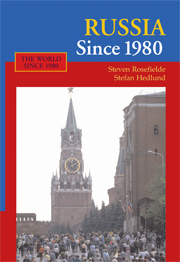Preface
Published online by Cambridge University Press: 05 June 2012
Summary
Soviet civilization failed. This was the verdict of its leaders, and the judgment of history. Whatever its merits may have been, they were eclipsed by the system's material and spiritual defects. What went wrong? Was Bolshevism a degenerate form of the Russian idea? Is the Russian inferior? Or did the fault lie with socialism? Regardless of the answers, where should Russia be heading: toward American democratic free enterprise, European Union social democracy, Muscovy, slavophil anarcho-populism, or some Chinese-type fifth way? Choosing the right course has been the burning question of Russian history since Peter the Great flirted with westernization in the late seventeenth century, succinctly expressed by Nikolai Chernyshevsky's rallying cry “Chto delat?” (What is to be done?). Should Russia westernize in a libertarian or socialist mode, trust in anarcho-populism, or, as slavophiles argued, follow a more spiritual trajectory?
Westernizing intellectuals from the eighteenth century onward, such as Mikhail Tugan-Baranovsky, championed democracy and markets running the gamut from Smithian small government libertarianism to Meadean social democracy. The common denominators connecting these ideas were individual empowerment, happiness, sovereignty, and social justice. The good society for westernizers was one in which people were free to maximize their utility, constrained only by a Lockean social contract, including the rule of law and the democratic provision of collectivist public services.
Anarcho-populists shared similar goals, but distrusted capitalist markets, while slavophiles saw unbridled individual self-seeking as an Enlightenment anathema. They advocated communalist principles of social organization and mutual support instead.
- Type
- Chapter
- Information
- Russia Since 1980 , pp. xxi - xxivPublisher: Cambridge University PressPrint publication year: 2008

